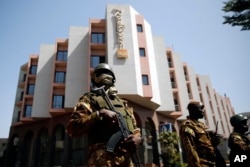The terrorist attack on an upscale Bamako hotel killed 21 people. But there may be another victim as well -- the Mali economy. Heightened security risks could frighten off foreign investors and tourists as Mali tries to restart its sputtering economy after three years of conflict and political crisis.
In the busy streets of Mali's capital city, Bamako, the immediate impact of the November 20th terrorist attack is to be found inside hotel reservation books, said Sidy Keita, national deputy director of the Malian Office for Tourism and Hospitality.
"We haven't lost hope. We know that right now, there have been a lot of hotel booking cancellations and that a lot of public manifestations have been cancelled. But we hope that very soon we'll see a return of peace and of foreign tourists," said Keita.
Last June, a peace deal signed between Tuareg separatists and the Malian government raised hopes of finally seeing the end of the tunnel after three years of crisis for the West Africa nation, but its implementation has proven challenging.
The country remains also plagued with various jihadist groups committing acts of violence across the country. Two claimed to be behind the recent attacks in Bamako.
As for foreign tourists, they deserted Mali a long time ago, says arts and crafts maker Modibo Nimaga, whose shop is located in a once popular tourist market.
"Before, we would have about 80 customers per week. But nowadays, we can spend a month without seeing any white tourist," said Nimaga.
This latest attack, the second one of the year in Bamako, threatens to drive the few remaining foreign investors farther away from the country as well.
Moussa Ismaïla Toure directs an agency in charge of promoting Mali to investors and said he is optimistic this attack will not affect investments.
"2014 was particularly slow. We had only a total of $65 million in investment intentions. But 2015 will be better, as we already are close to $160 million. That means that there is a recovery. Maybe these latest events will slow us down a bit, but we hope it won't last," said Toure.
In terms of economic growth, Mali is set to slow to 4.9 percent in 2015, according to the IMF, due to a weakened manufacturing output.







